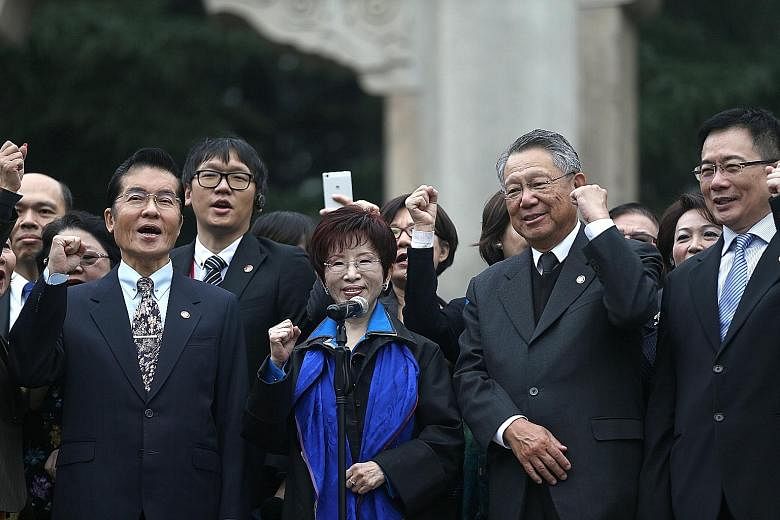Chinese President Xi Jinping, who is general secretary of the Chinese Communist Party (CCP), and Ms Hung Hsiu-chu, leader of Taiwan's biggest opposition party Kuomintang (KMT), have both vowed to oppose Taiwan's independence.
At the first meeting between the two parties after the KMT lost power in January to Taiwan's independence-leaning Democratic Progressive Party (DPP), both leaders also stressed the importance of upholding the "one China" policy as the basis for maintaining cross- strait peace and stability.
"Going forward, both the CCP and KMT must be responsible to the people and to history... (and) strengthen our political foundation based on the 1992 Consensus, and be resolutely against Taiwan independence," Mr Xi told Ms Hung at their meeting yesterday at the Great Hall of the People in Beijing.
The 1992 Consensus refers to a tacit agreement between China and Taiwan that there is one China, with each side having its own interpretation of what it means.
In response, Ms Hung, who is on a five-day visit to China, said she can feel Mr Xi's "anxieties" about the current cross-strait situation. Even though the KMT is now an opposition party, it has never forgotten its mission of maintaining good cross-strait ties, she said.
She told Mr Xi that the KMT in September adopted a new policy platform that stresses the importance of a peaceful resolution to cross-strait hostility, as opposed to the pro-independence policy advocated by the ruling DPP.
Ms Hung's visit comes after Beijing cut all official exchanges with Taipei after DPP leader Tsai Ing- wen became President in May. While Ms Tsai has repeatedly said she is willing to hold talks with China, she has not endorsed the 1992 Consensus, Beijing's basis for high- level engagement with Taipei.
Analysts told The Straits Times that this high-level visit is an indication to Ms Tsai, the DPP and the Taiwanese public that Beijing is willing to continue with cross- strait interactions as long as the 1992 Consensus is recognised.
"But Ms Tsai is unlikely to cower under the pressure," said Dr Wang Weinan from the Shanghai Academy of Social Sciences. "This may work on some of the more moderate DPP members, and they may start to adjust accordingly. But I'm not optimistic about the effect on Ms Tsai as she has strong faith in her beliefs."
Beijing Union University cross- strait expert Zhu Songling said the visit shows that the CCP still views the KMT as an important channel for maintaining cross-strait communications and ties. "Despite the KMT being the opposition party, the CCP still gave it high-level access to its leaders. This shows the kind of respect it gives to anyone or any political party that adheres to the 1992 Consensus," he said.
Yesterday, in response to the meeting, Ms Tsai reiterated her call to Beijing to recognise the existence of the Republic of China. "The leaders and government from both sides of the Taiwan Strait should show their wisdom and flexibility in bringing the existing disputes to a win-win outcome in the future," she said.
New Power Party chairman Huang Kuo-chang lambasted the meeting, saying the KMT's strategy of echoing the CCP's "one China" stance has distanced the party further from Taiwan's mainstream public opinion.

